Change Packages and Action Guides
The Million Hearts® Action Guide series provides clinicians, employers, and public health practitioners with evidence-based strategies for improving cardiovascular health. Each guide offers action steps and features proven tactics to help more Americans live heart-healthy, stroke-free lives.
For Clinicians
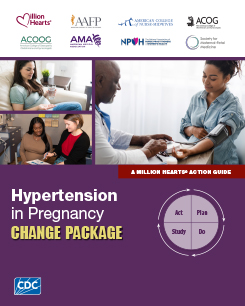
Hypertension in Pregnancy Change Package
Outpatient clinical settings can use this guide to put systems in place to improve the care they provide for women with hypertension in pregnancy.
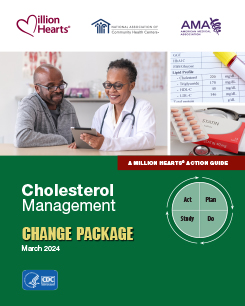
Cholesterol Management Change Package
The purpose of this new change package is to help health care practices put more efficient and effective systems in place to care for patients with hyperlipidemia. Health care professionals in outpatient clinical settings can use these evidence-based process improvements as they seek optimal cholesterol management.
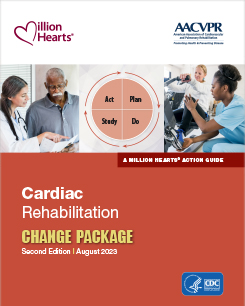
Cardiac Rehabilitation Change Package (Second Edition)
This change package is a quality improvement tool to help teams from hospitals and cardiac rehabilitation programs put systems and strategies in place that target improved care for more eligible patients. It presents a listing of process improvements that cardiac rehabilitation champions can implement and includes change concepts, change ideas, and tools and resources.
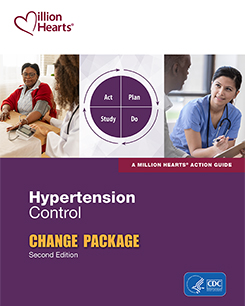
Hypertension Control Change Package (Second Edition)
The Hypertension Control Change Package lists process improvements that outpatient clinical settings can implement as they seek optimal hypertension (HTN) control. This updated version was prompted by new clinical guidelines, development of new resources, and general advances in quality improvement for HTN management.
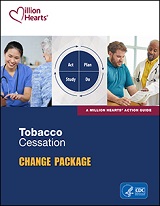
Tobacco Cessation Change Package
This change package presents a list of process improvements that clinicians can implement as they seek to deliver optimal treatment to patients who use tobacco. The change package is a quality improvement tool to help health care professionals in outpatient, inpatient, and behavioral health settings, and public health professionals who partner with these groups.
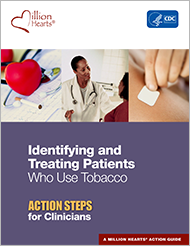
Identifying and Treating Patients Who Use Tobacco: Action Steps for Clinicians
This guide provides evidence-based, tested tobacco use identification and intervention strategies for busy clinicians. These strategies consist of actions clinicians can take to improve care delivery and ways to increase the use of evidence-based brief interventions for patients who use tobacco. Additional resources and references for each action step are also included in this guide.
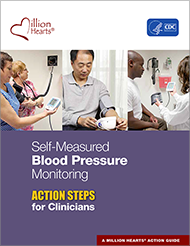
Self-Measured Blood Pressure Monitoring: Action Steps for Clinicians
Self-measured blood pressure monitoring plus additional clinical support is one strategy that can reduce the risk of disability or death from high blood pressure. The purpose of this guide is to help clinicians implement self-measured blood pressure monitoring in their practices by providing evidence-based action steps and resources.
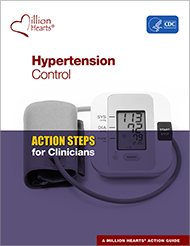
Hypertension Control: Action Steps for Clinicians
This guide delivers proven strategies to help busy clinicians work with their patients to control hypertension. Strategies include creative ways for clinicians to deliver care, improve medication adherence, and optimize patient reminders and supports. The guide contains resources and references to help clinicians find even more information for each action step.
For Public Health Practitioners and Employers
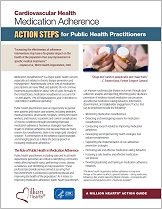
Medication Adherence: Action Steps for Public Health Practitioners
This guide provides a call to action for public health practitioners to support evidence- and practice- based medication adherence strategies that improve blood pressure control. Additional resources and references for each action step are also included in this guide.
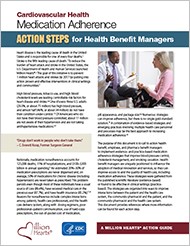
Medication Adherence: Action Steps for Health Benefit Managers
This guide provides a call to action for health, employer, and pharmacy benefit managers to implement evidence- and practice-based medication adherence strategies that improve blood pressure control, cholesterol management, and smoking cessation. Additional resources and references for each action step are also included in this guide.
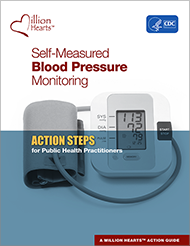
Self-Measured Blood Pressure Monitoring: Action Steps for Public Health Practitioners
Strong evidence suggests that self-measured blood pressure monitoring—when combined with regular support from trained health care professionals—is effective in lowering blood pressure among hypertensive patients. This guide outlines action steps that public health practitioners can take to support self-measured blood pressure monitoring.
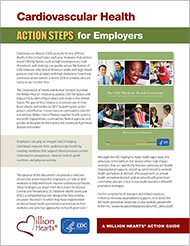
Cardiovascular Health: Action Steps for Employers
Employers can help their employees improve cardiovascular health by creating worksites that support blood pressure control, cholesterol management, tobacco control, good nutrition, and physical activity. This guide offers a selection of concrete action steps that employers can take to help individuals improve cardiovascular health.
